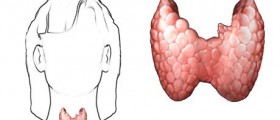
The thyroid gland is an endocrine gland made of 2 lobes connected by the isthmus. The gland is located in the front part of the neck and when it is of normal size and not enlarged it cannot be palpated. However, any enlargement, no matter if it is in a form of completely enlarged gland or the presence of some nodules, can be easily palpated and if big enough, even seen with the naked eye.
A goiter is the term used for enlarged thyroid gland. Such enlargement may be diffuse, affecting the entire gland, or nodular, located to certain parts of the gland. The very location of the thyroid gland makes the problem serious if it grows huge. In such case one may develop different symptoms and signs of compression of nearby organs such as the trachea, larynx, superior and/or inferior laryngeal nerve and esophagus.
The affected gland may continue producing hormones normally, increase such production or reduce the production of thyroid hormones and this is why goiter can be further classified as nontoxic, overactive and hypothyroid goiter.Pathophysiology of Goiter
The thyroid gland is under control of thyroid-stimulating hormone produced by the pituitary gland.
In majority of cases goiter develops due to insufficient intake of iodine. Namely, iodine is essential for synthesis of thyroid hormones. If there is not enough iodine in the body, thyroid stimulating hormone is increased and it intensively stimulates the thyroid gland to produce its hormones. However, due to practically complete absence of iodine, the gland may only enlarge in size but remain non-functional i.e. cannot synthesize thyroid hormones.
Apart from the mentioned goiter may also occur with Grave's disease, Hashimoto's thyroiditis and thyroid cancer. Thyroid gland enlargement is also possible in case of thyroid gland inflammation, multinodular goiter, solitary thyroid nodules or pregnant women.
Goiter: Treatment Options
Small goiters that are confirmed to be benign require no treatment at all. Large goiters, on the other hand, are treated either conservatively or surgically. Malignant goiters are treated with both, medicamentous treatment and surgery as well as some additional treatments.
Patients who lack iodine must start consuming food rich in iodine and increase daily intake of this element. Furthermore, the level of thyroid hormones in patients with hyperthyroidism or hypothyroidism must be brought under control.
Patients with goiter who are not surgically treated must be monitored and undergo regular check-ups, particularly those who are at risk of developing thyroid gland cancer. This way, doctors may notice rapid growth of the goiter and early signs of potential compression of nearby organs and treat these health issues timely.













-In-Infants-And-Older-Children_f_280x120.jpg)


-During-Pregnancy_f_280x120.jpg)
Your thoughts on this
Loading...